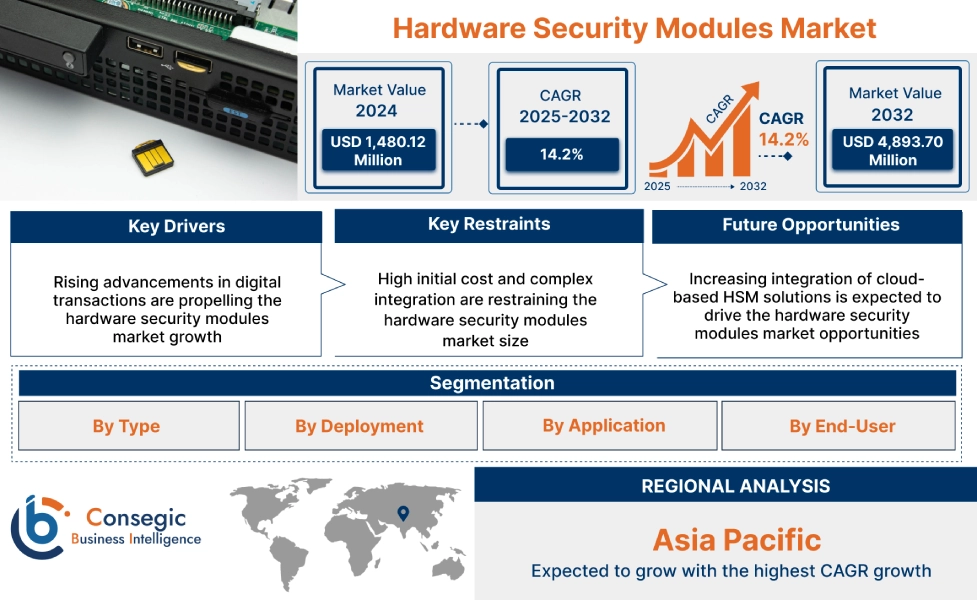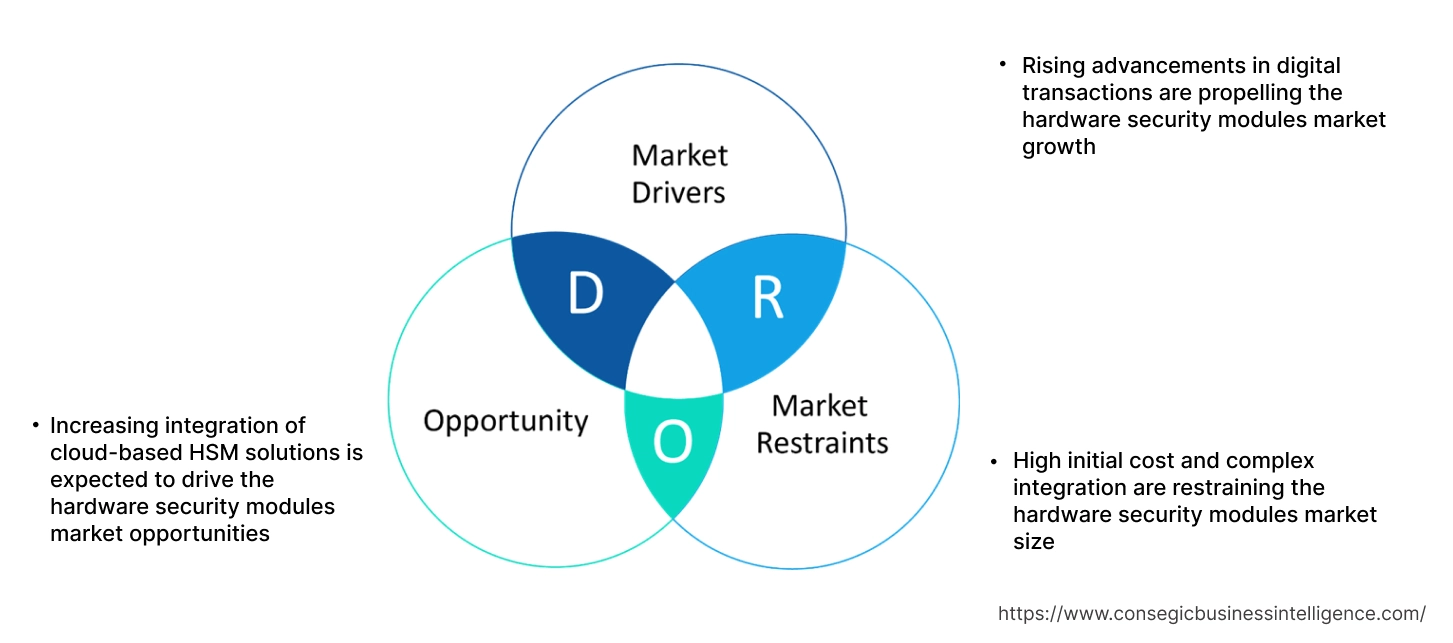Hardware Security Modules Market Size:
Hardware Security Modules Market size is estimated to reach over USD 4,893.70 Million by 2032 from a value of USD 1,480.12 Million in 2024 and is projected to grow by USD 1,690.15 Million in 2025, growing at a CAGR of 14.2% from 2025 to 2032.
Hardware Security Modules Market Scope & Overview:
Hardware security module (HSM) refers to a tamper-resistant device that is designed to manage, store, and process cryptographic operations. Moreover, HSM plays an essential role in securing sensitive data by performing various types of tasks like encryption, decryption, authentication, and others within a protected environment. Additionally, the primary functions of HSM include key generation, storage, digital signing, and others, which are essential for secure and compliant operations in sectors such as banking, healthcare, government, cloud computing, and e-commerce among others. Further, rising technological advancements related to hardware security are driving the market.
How is AI Transforming the Hardware Security Modules Market?
The integration of AI is considerably transforming the hardware security modules market. The incorporation of AI in hardware security modules helps in enhancing their functionality and security capabilities. AI can analyze vast amounts of data within an HSM to identify unusual patterns and anomalies that may indicate potential security threats. This enables faster and more proactive threat detection.
Additionally, AI integration can automate the process of key generation, storage, and rotation within the HSM, which helps in streamlining key management and reducing the risk of human error. Further, AI can also help in predicting potential vulnerabilities in key management systems, thereby facilitating proactive mitigation strategies. Consequently, the above factors are anticipated to drive the market growth in upcoming years.
Hardware Security Modules Market Dynamics - (DRO) :
Key Drivers:
Rising advancements in digital transactions are propelling the hardware security modules market growth
The rising adoption of digital transactions is primarily driven by the increasing adoption of mobile wallets, unified payments interface systems, contactless payments, and others. Moreover, HSM plays an essential role in securing digital payment by performing cryptographic operations like PIN encryption, transaction authorization, and key storage. Additionally, by ensuring confidentiality, HSM helps various financial institutions and payment service providers to maintain compliance with regulatory standards. Consequently, the rising advancements in digital transactions is driving the market.
- For instance, in February 2025, Maximus Infoware integrated Futurex’s Encrypt Plus Payment HSM into its ATRA platform. Moreover, this integration provides improved security for its end-to-end transaction encryption.
Thus, the rising advancements in digital transactions are propelling the hardware security modules market expansion.
Key Restraints:
High initial cost and complex integration are restraining the hardware security modules market size
HSMs are tamper-resistant hardware devices that need a significant capital expenditure, making them less accessible for small and medium enterprises. Moreover, integration of HSM with existing IT infrastructure requires specialized technical expertise, which further adds to the cost of HSM maintenance.
Additionally, implementation of HSM requires robust control policies and continuous monitoring to ensure seamless operation. Therefore, the aforementioned factors are hindering the hardware security modules market.
Future Opportunities :
Increasing integration of cloud-based HSM solutions is expected to drive the hardware security modules market opportunities
The increasing adoption of cloud-based HSM solutions is driving the market. Cloud-based HSM offers several benefits like scalability, enhanced security, advanced technologies, and access to advanced cryptographic technologies to ensure compliance with regulatory standards. Moreover, the rising adoption of technologies like blockchain, cryptocurrency, and the internet of things (IoT) is driving the need for HSM solutions to protect sensitive data.
- For instance, in August 2023, Thales Corporation introduced its payShield Cloud HSM, which is a subscription-based cloud HSM service. Moreover, this cloud-based hardware security module is designed for digital payments that are built for payment brands and to support cloud environments.
Therefore, the increasing integration of cloud-based hardware security modules is projected to boost the hardware security modules market opportunities during the forecast period.
Hardware Security Modules Market Segmental Analysis :
By Type:
Based on type, the market is segmented into general purpose, payment hardware security module, and others.
Trends in the type:
- There is a rising trend towards the adoption of HSM due to the rise in integration with advanced technologies like blockchain, cloud, IoT, and others, which is further driving the market.
- Increasing trend in adoption of HSM due to rising adoption in digital payment adoption such as mobile wallets and UPI (unified payments interface) is driving the hardware security modules market growth.
General purpose segment accounted for the largest revenue share in the overall hardware security modules market share in 2024.
- General-purpose HSMs are virtual devices that are designed to manage, generate, and protect cryptographic keys.
- They offer a wide range of benefits including high-level security, support for various cryptographic algorithms, and others.
- Moreover, general-purpose HSM is primarily used for tasks like data encryption, decryption, and digital certificate management.
- For instance, in October 2023, Entrust announced the launch of cloud-based general-purpose HSM, which is designed for modern workloads such as DevSecOps, blockchain, IoT applications, and others.
- Hence, rising advancements related to general-purpose HSMs are driving the market growth.
Payment hardware security module segment is anticipated to register a substantial CAGR growth during the forecast period.
- Payment hardware security module is a specialized cryptographic device that is utilized to secure and process sensitive payment-related information.
- Payment HSM performs various types of tasks like PIN translation, card verification, and EMV translation processing, which are designed to support secure mobile payments.
- For instance, in April 2025, Utimaco launched a payment hardware security module on IBM cloud for financial services. Moreover, this software offers various benefits, including cloud-native deployment, PCI-compliance key management, and others.
- Hence, increasing technological advancements associated with payment hardware security module are projected to drive the hardware security modules market size during the forecast period.
By Deployment:
Based on deployment, the market is segmented into cloud and on premise.
Trends in the deployment:
- Increasing technological advancements associated with the integration of AI in HSMs are driving the market demand.
- The rise in adoption of cloud-based HSMs to manage orders in various sectors, including automotive, pharmaceuticals, and others, due to their scalability is driving the market.
Cloud segment accounted for the largest revenue in the overall hardware security modules market share in 2024 and it is anticipated to register a significant CAGR growth during the forecast period.
- Cloud-based HSMs are virtual and physical cryptographic devices that deliver cloud as a service.
- They offer secure key management and cryptographic operations along with a wide range of benefits like scalability, cost-effectiveness, and ease of deployment.
- For instance, in September 2022, Marvel launched its liquid security2 model of hardware security module designed for multi-tenant environments. Moreover, this solution provides encryption, key management, and other security services for various applications.
- Therefore, rising advancements related to cloud-based HSMs are further projected to drive the market during the forecast period.
By Application:
Based on application, the market is segmented into websites, banking apps, mobile payments, cryptocurrencies, and others.
Trends in the application:
- Increasing use of hardware security modules in banking apps due to secured encryption for ATMs is driving the hardware security modules market trends.
- Rising trend in adoption of HSM in mobile payments to facilitate secure transaction process and protection against fraud is driving the market.
The banking apps segment accounted for the largest revenue share in the overall market in 2024.
- In banking apps, hardware security module plays an essential role for ensuring the security, integrity, and compliance of the banking applications.
- Moreover, in banking apps, HSMs are used to encrypt and decrypt financial data, securely generate and validate customer PINs during transactions, and manage cardholder data like permanent account numbers among others.
- For instance, PAX Global Technology utilizes Amazon cloud-based HSM to secure its software as a service payment service. Moreover, this payment service enables multi-tenant key isolation for merchant security and accelerated deployment by 40% faster product delivery.
- Therefore, according to the hardware security modules market analysis, the above factors are driving the market.
The mobile payments segment is anticipated to register the fastest CAGR growth during the forecast period.
- In mobile payments, HSMs are primarily used to support secure tokenization, digital wallet provisioning, and transaction authentication when a user initiates a mobile payment.
- Moreover, HSMs in mobile payments are used to manage the Euro Pay, MasterCard, and Visa key management for contactless transactions to enable a secure mobile tap-to-pay experience.
- Additionally, HSM offers a wide range of benefits like enhanced security, secure tokenization, real-time transaction authentication, and EMV key management, which makes it ideal for use in mobile payment applications.
- Hence, according to the market analysis, the above factors are projected to boost the market during the forecast period.
By End User:
Based on end user, the market is segmented into BFSI, automotive, IT and telecommunications, retail and e-commerce, healthcare, manufacturing and others.
Trends in the end user:
- Increasing use of hardware security modules in BFSI industry due to increasing need for advanced security in banking apps is driving the hardware security modules market trends.
- Rising adoption of HSM in e-commerce due to increasing regulatory frameworks for data protection compliance is driving the market.
BFSI segment accounted for the largest revenue share of 36.52% in the overall market in 2024.
- In the BFSI sector, HSMs are essential for various types of applications like ATM and POS PIN validation, card issuance, and others.
- Moreover, they support tokenization by helping financial institutions replace sensitive data like PANs with secure tokens for fraud protection.
- For instance, in December 2024, Futurex announced the collaboration with Cake Digital Bank which is based in Vietnam to deploy a cloud-based management system using VirtuCrypt cloud payment HSM. Moreover, this HSM secures token issuance, EMV key management, and others to ensure high reliability.
- Therefore, according to the market analysis, the above factors are diving the market.
The retail and e-commerce segment is anticipated to register a substantial CAGR growth during the forecast period.
- In the e-commerce sector, HSM is used to encrypt payment card data, manage digital certificates for secure web connections, and generate card tokens.
- Moreover, cloud-based HSMs offer various types of benefits like cost-effective scalability, high availability through multi-AZ clustering, and centralized key management through standard APIs.
- For instance, in June 2022, NAVER Cloud launched the cloud HSM as a service, which is powered by Thales Luna network HSM. This service is designed to simply meet industrial demands, particularly for e-commerce and other businesses.
- Hence, the above factors are projected to boost the market during the forecast period.
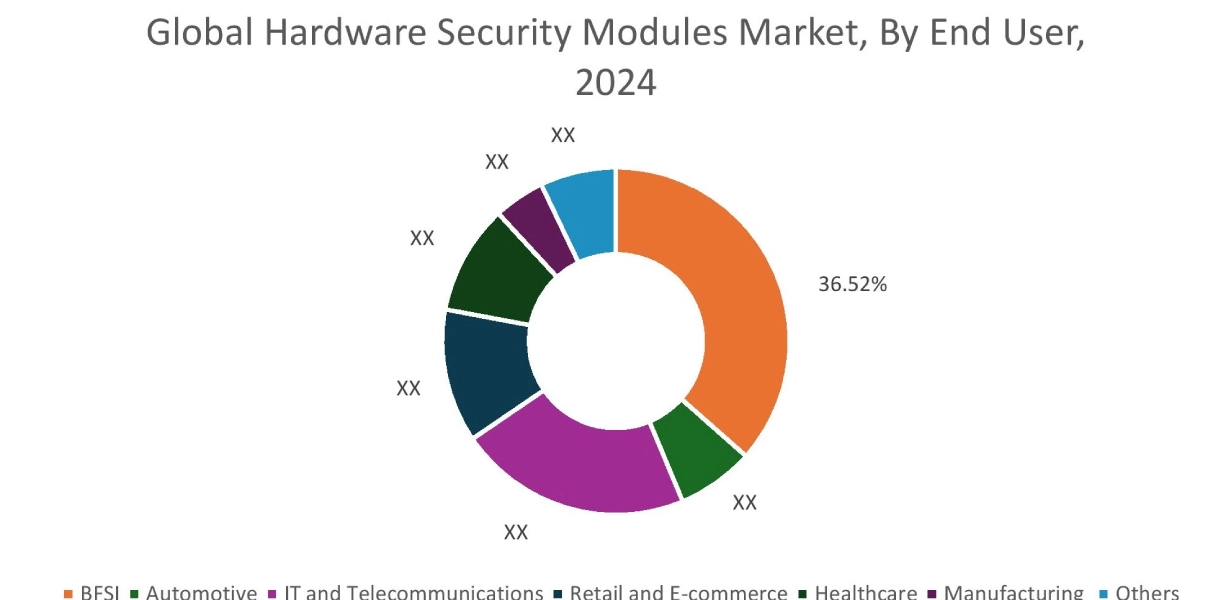
By Regional Analysis:
The regions covered are North America, Europe, Asia Pacific, Middle East and Africa, and Latin America.
Asia Pacific region was valued at USD 348.33 Million in 2024. Moreover, it is projected to grow by USD 399.35 Million in 2025 and reach over USD 1,206.79 Million by 2032. Out of this, China accounted for the maximum revenue share of 33.82%. As per the hardware security modules market analysis, the adoption of HSM in the Asia-Pacific region is primarily driven by the rising need for secure encryption for ATM transactions, mobile banking, and payment processes among others. Additionally, the rising advancements related to cloud-based HSM, driven by their scalability, cost-effectiveness, and ease of integration, are further accelerating the hardware security modules market expansion.
- For instance, in January 2025, Jisa Softech launched a payment hardware security module, which is designed to manage cryptographic operations and secure sensitive payment information. The above factors are driving the market in the region.
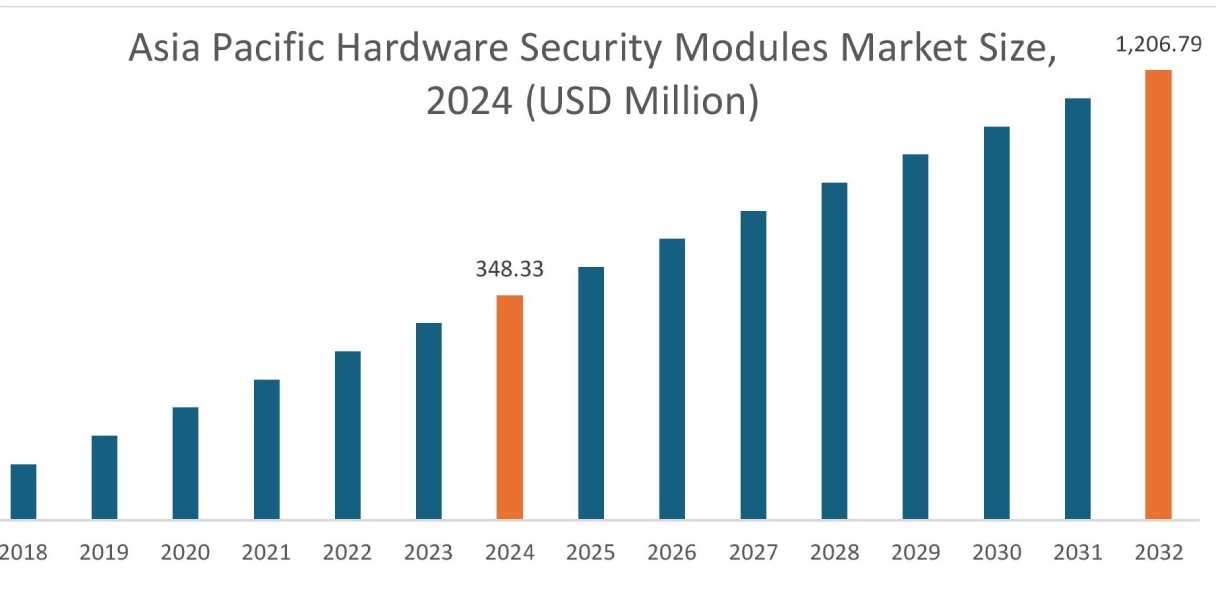
North America is estimated to reach over USD 1,783.26 Million by 2032 from a value of USD 541.84 Million in 2024 and is projected to grow by USD 618.49 Million in 2025. In North America, the adoption of HSM is driven by an increasing need to protect sensitive data in BFSI and healthcare sectors along with rising adoption of HSM in the region. Similarly, rising developments associated with healthcare, IT & telecommunications, and financial services are contributing to the hardware security modules market demand.
- For instance, in May 2024, Crypto4A Technologies, a Canadian company, launched a modular-based hardware security module, which is designed to provide cryptographic agility, and scalability to optimize operational efficiencies.
Additionally, the regional analysis depicts that the growing adoption of HSM due to its seamless integration with enterprise IT systems, rising demand for cryptographic security solutions, and others are driving the hardware security modules market demand in Europe. Furthermore, as per the market analysis, the market demand in Latin America, Middle East, and African regions is expected to grow at a considerable rate due to factors such as significant investments in BFSI, healthcare, and other industrial sectors, increasing technological advancements, and growing use of encryption and tokenization technologies among others.
Top Key Players & Market Share Insights:
The global hardware security modules market is highly competitive with major players providing solutions to the national and international markets. Key players are adopting several strategies in research and development (R&D), product innovation, and end-user launches to hold a strong position in the hardware security modules industry. Key players in the hardware security modules industry include-
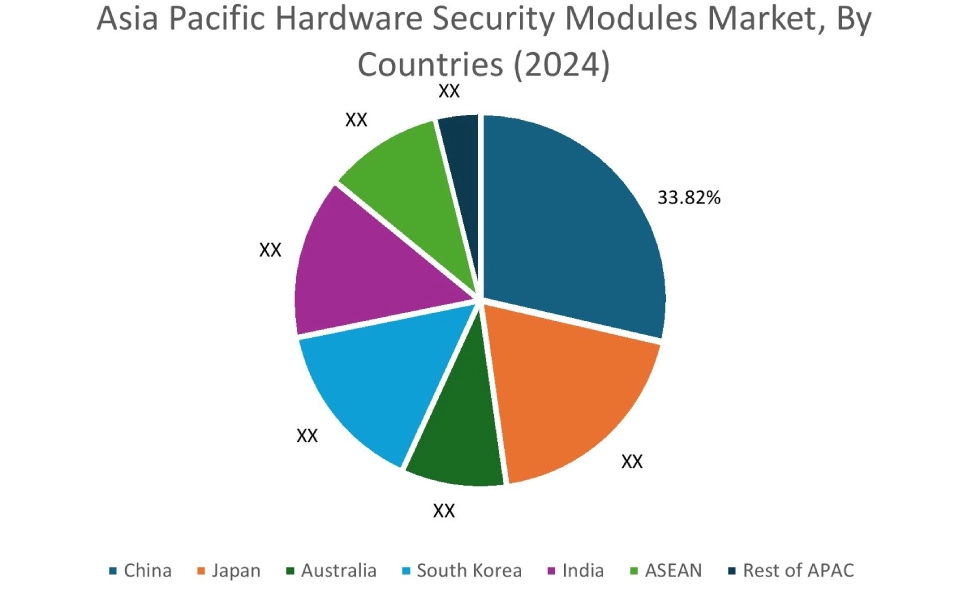
Top Key Players and Market Share Insights:
The baked savory snacks industry is highly competitive with major players providing solutions and services to the national and international markets. Key players are adopting several strategies in research and development (R&D), product innovation, and end-user launches to hold a strong position in the global Cardiac Medical Device Market. Key players in the baked savory snacks industry include
- Thales Group (France)
- Entrust Corporation (U.S.)
- Futurex Inc. (U.S.)
- IBM Corporation (U.S.)
- Microsoft Corporation (U.S.)
- Yubico AB (U.S.)
- Amazon Web Service, Inc. (U.S.)
- Securoys (Switzerland)
- GuardAmerica (U.S)
- Infineon Technologies (Germany)
Hardware Security Modules Market Report Insights :
| Report Attributes | Report Details |
| Study Timeline | 2019-2032 |
| Market Size in 2032 | USD 4,893.70 Million |
| CAGR (2025-2032) | 14.2% |
| By Type |
|
| By Deployment |
|
| By Application |
|
| By End User |
|
| By Region |
|
| Key Players |
|
| North America | U.S. Canada Mexico |
| Europe | U.K. Germany France Spain Italy Russia Benelux Rest of Europe |
| APAC | China South Korea Japan India Australia ASEAN Rest of Asia-Pacific |
| Middle East and Africa | GCC Turkey South Africa Rest of MEA |
| LATAM | Brazil Argentina Chile Rest of LATAM |
| Report Coverage |
|
Key Questions Answered in the Report
How big is the hardware security modules market? +
The hardware security modules market was valued at USD 1,480.12 Million in 2024 and is projected to grow to USD 4,893.70 Million by 2032.
Which is the fastest-growing region in the hardware security modules market? +
Asia-Pacific is the region experiencing the most rapid growth in the hardware security modules market.
What specific segmentation details are covered in the hardware security modules report? +
The hardware security modules report includes specific segmentation details for type, deployment, application, end user, and region.
Who are the major players in the hardware security modules market? +
The key participants in the hardware security modules market are Thales Group (France), Entrust Corporation (U.S.), Futurex Inc. (U.S.), IBM Corporation (U.S.), Microsoft Corporation (U.S.), Yubico AB (U.S.), Amazon Web Service, Inc. (U.S.), Securoys (Switzerland), GuardAmerica (U.S), Infineon Technologies (Germany) and others.
